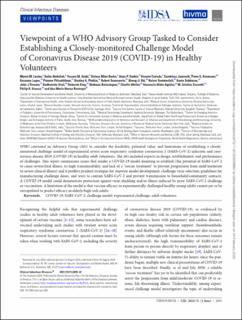Viewpoint of a WHO Advisory Group Tasked to Consider Establishing a Closely-monitored Challenge Model of Coronavirus Disease 2019 (COVID-19) in Healthy Volunteers
Levine, Myron M; Abdullah, Salim; Arabi, Yyaseen M.; Darko, Delese Mimi; Durbin, Anna P; Estrada, Vicente; Jamrozik, Euzebiusz; Kremsner, Peter G; Lagos, Rosanna; Pitisuttithum, Punnee; Plotkin, Stanley A; Sauerwein, Robert; Shi, Sheng-Li; Sommerfelt, Halvor; Subbarao, Kanta; Treanor, John J; Vrati, Sudhanshu; King, Deborah; Balasingam, Shobana; Weller, Charlie; Aguilar, Anastazia Older; Cassetti, M. Cristina; Krause, Philip R; Restrepo, Ana Maria Henao
Journal article, Peer reviewed
Published version

Åpne
Permanent lenke
https://hdl.handle.net/11250/2981897Utgivelsesdato
2021Metadata
Vis full innførselSamlinger
Sammendrag
WHO convened an Advisory Group (AG) to consider the feasibility, potential value, and limitations of establishing a closely-monitored challenge model of experimental severe acute respiratory syndrome coronavirus 2 (SARS-CoV-2) infection and coronavirus disease 2019 (COVID-19) in healthy adult volunteers. The AG included experts in design, establishment, and performance of challenges. This report summarizes issues that render a COVID-19 model daunting to establish (the potential of SARS-CoV-2 to cause severe/fatal illness, its high transmissibility, and lack of a “rescue treatment” to prevent progression from mild/moderate to severe clinical illness) and it proffers prudent strategies for stepwise model development, challenge virus selection, guidelines for manufacturing challenge doses, and ways to contain SARS-CoV-2 and prevent transmission to household/community contacts. A COVID-19 model could demonstrate protection against virus shedding and/or illness induced by prior SARS-CoV-2 challenge or vaccination. A limitation of the model is that vaccine efficacy in experimentally challenged healthy young adults cannot per se be extrapolated to predict efficacy in elderly/high-risk adults.
